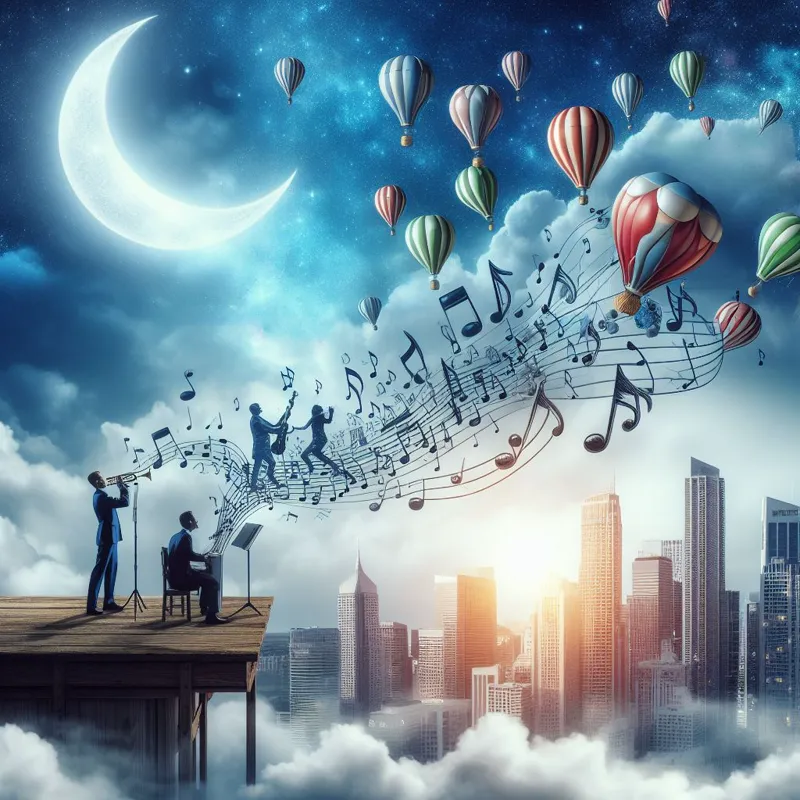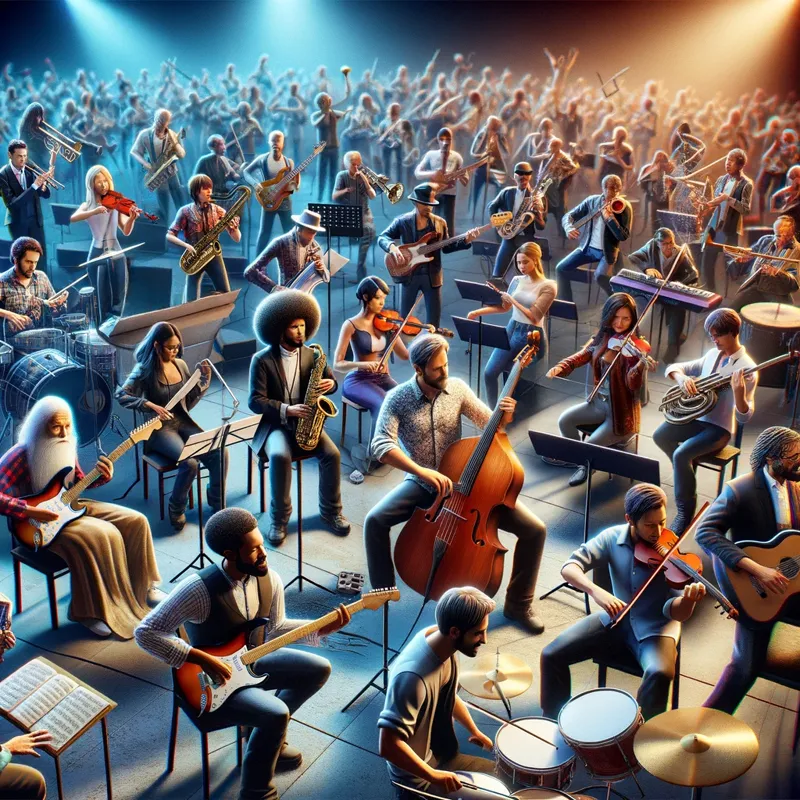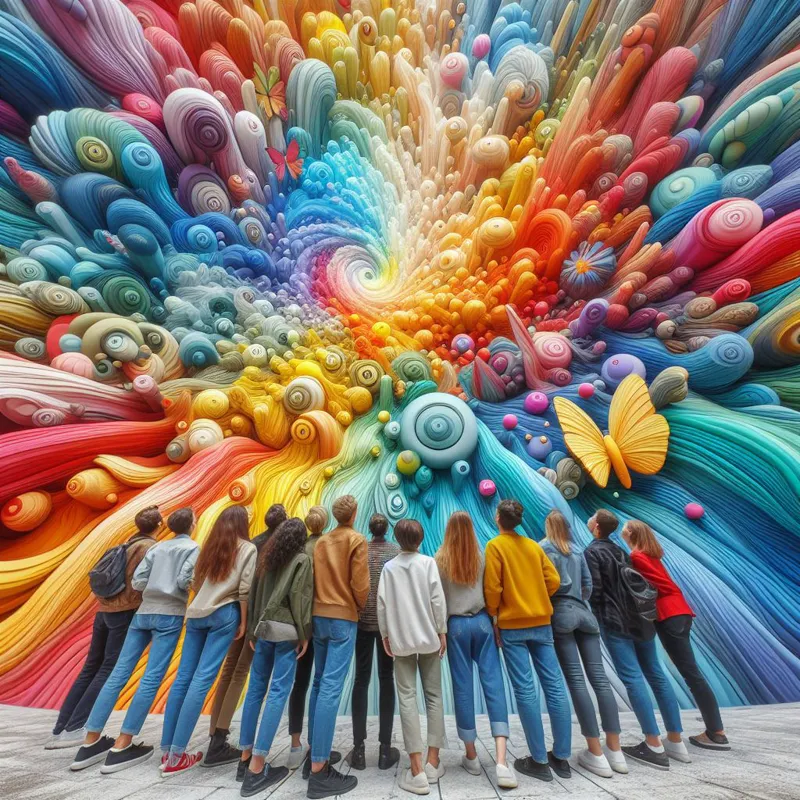
And we'll all float on
Music, a timeless and universal form of expression, wields a transformative power that permeates every aspect of human existence. It transcends cultural and linguistic barriers, echoing the deepest emotions and experiences of life. This art form, both ancient and ever-evolving, serves as a bridge between the tangible and the intangible, capturing the essence of human joy, sorrow, and everything in between.
Music's influence extends far beyond mere entertainment; it shapes our emotions, intellect, social connections, and cultural identities. It's an ethereal force that can alter moods, inspire change, and even heal. As we explore the multifaceted impact of music, we delve into its role not just as a source of melody and rhythm, but as a powerful catalyst for emotional healing, cognitive development, social unity, cultural preservation, spiritual connection, physical well-being, and personal growth.
Emotional Healing

Jam session
Music possesses a unique ability to heal emotional wounds. It can provide solace in grief, joy in celebration, and comfort in solitude. In therapeutic settings, music is used to help individuals process and express emotions that might otherwise be difficult to articulate.

Friction, Earth and sky.
Furthermore, certain melodies and rhythms can evoke powerful emotional responses, allowing listeners to experience catharsis, peace, or euphoria. The emotional impact of music is deeply personal yet universally understood, making it a powerful tool for emotional healing and well-being.
Cognitive Enhancement

...helped me write this song
Music also plays a significant role in cognitive development and enhancement. Learning and engaging with music can improve memory, concentration, and problem-solving skills. It stimulates different areas of the brain, enhancing neural connections and cognitive abilities.

Raise the bar
In educational contexts, music is used to enhance learning and retention of information. It's not just about the 'Mozart Effect' but about how music, in its complexity and structure, challenges the brain, fostering intellectual growth and cognitive agility.
Social Connection

Twilight lullaby
Music serves as a powerful catalyst for social bonding and connection. It transcends language barriers and cultural differences, bringing people together in a shared experience. Whether it's through communal singing, attending concerts, or simply sharing playlists, music creates a sense of belonging and community.

Blow the roof off
In group settings, music can synchronize emotions and actions, leading to increased empathy and understanding among participants. It's a medium through which people can connect, celebrate, and communicate, fostering stronger social bonds and community cohesion.
Cultural Expression

Inexpressible through words
Music is a reflection of cultural identity and heritage. It tells stories of a people's history, struggles, and triumphs. Through music, cultural narratives are preserved and passed down through generations, keeping traditions alive and vibrant.

Why does the caged bird sing?
Each culture has its unique musical styles and instruments, which contribute to the rich tapestry of global music. These diverse musical expressions allow individuals to explore and celebrate their cultural roots while also appreciating the cultural expressions of others.
Spiritual Experience

Tribute
For many, music is a spiritual journey. It can evoke a sense of the divine, transcend the mundane, and provide a pathway to higher consciousness. In various religious and spiritual traditions, music is an integral part of worship and meditation.

Divine weaving
The spiritual power of music lies in its ability to quiet the mind, stir the soul, and evoke a sense of connectedness with something greater than oneself. It can be a source of solace, inspiration, and spiritual awakening.

What we find meaningful
Physical Health

Dawn of a new day
The impact of music extends to physical health and well-being. Rhythmic and harmonic elements in music can influence bodily functions, such as heart rate and breathing, promoting relaxation and stress reduction. Dance and movement to music also contribute to physical fitness and coordination.

Bright future
In healthcare settings, music therapy is used to support physical rehabilitation and enhance overall physical health. It can reduce pain, improve motor skills, and provide emotional support during physical recovery.

Life changing experience
Personal Growth

Grease
Engaging with music can be a journey of personal growth and self-discovery. Learning to play an instrument or understand musical theory challenges the mind, develops discipline, and fosters creativity. It's an exploration of one's capabilities and potential.
Music also offers a way to express oneself creatively, whether through composition, performance, or improvisation. This creative expression is not only fulfilling but also contributes to personal development, confidence, and a deeper understanding of oneself and the world.
The transformative power of music encompasses emotional, cognitive, social, cultural, spiritual, physical, and personal dimensions of human experience. It's a universal language that speaks to the heart, challenges the mind, and nourishes the soul, reflecting the complexity and richness of human life.

















